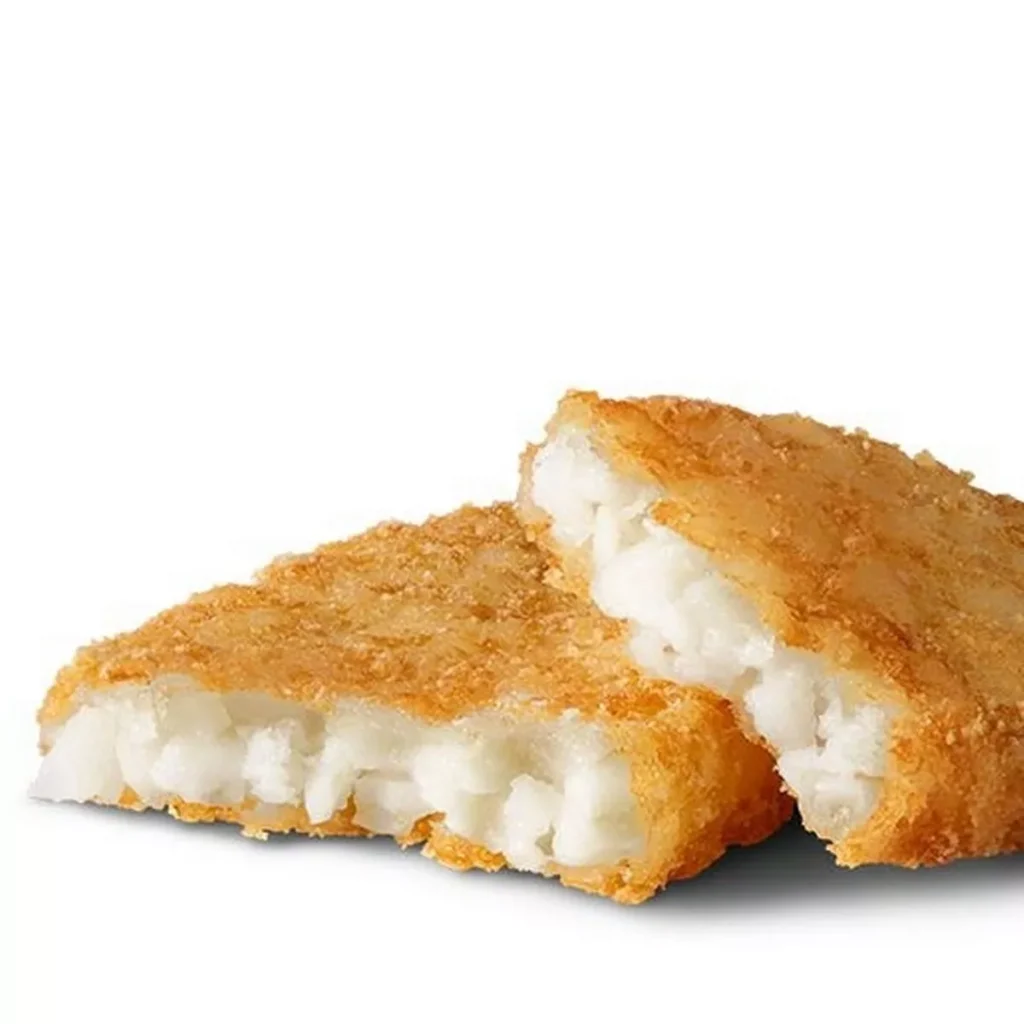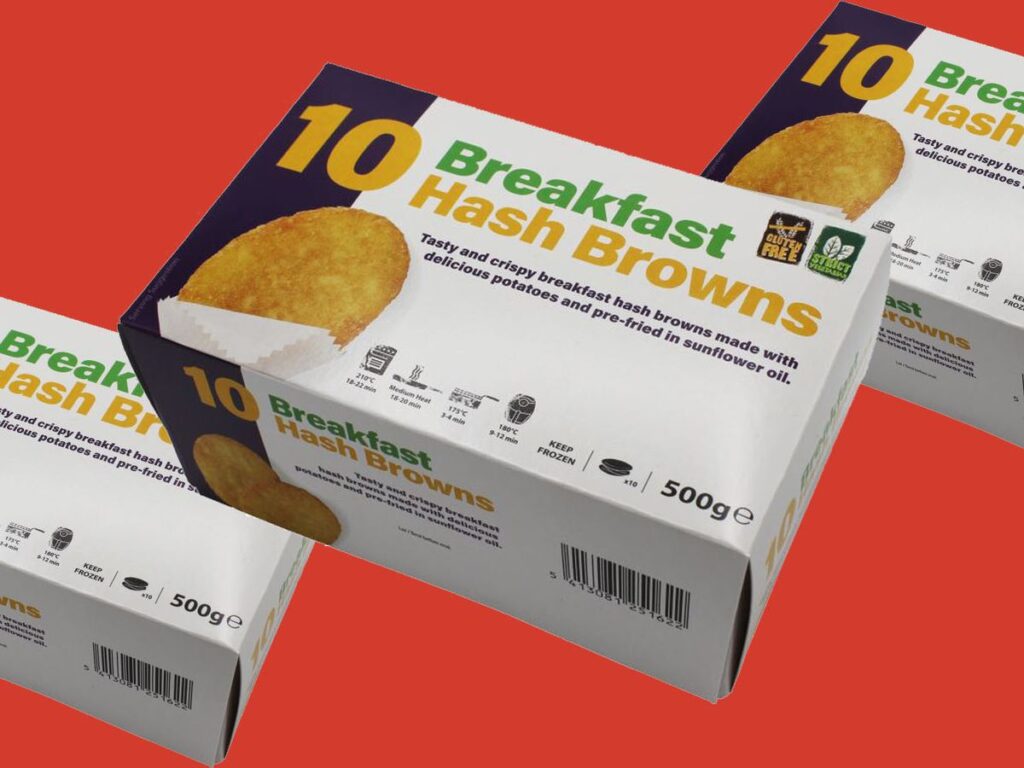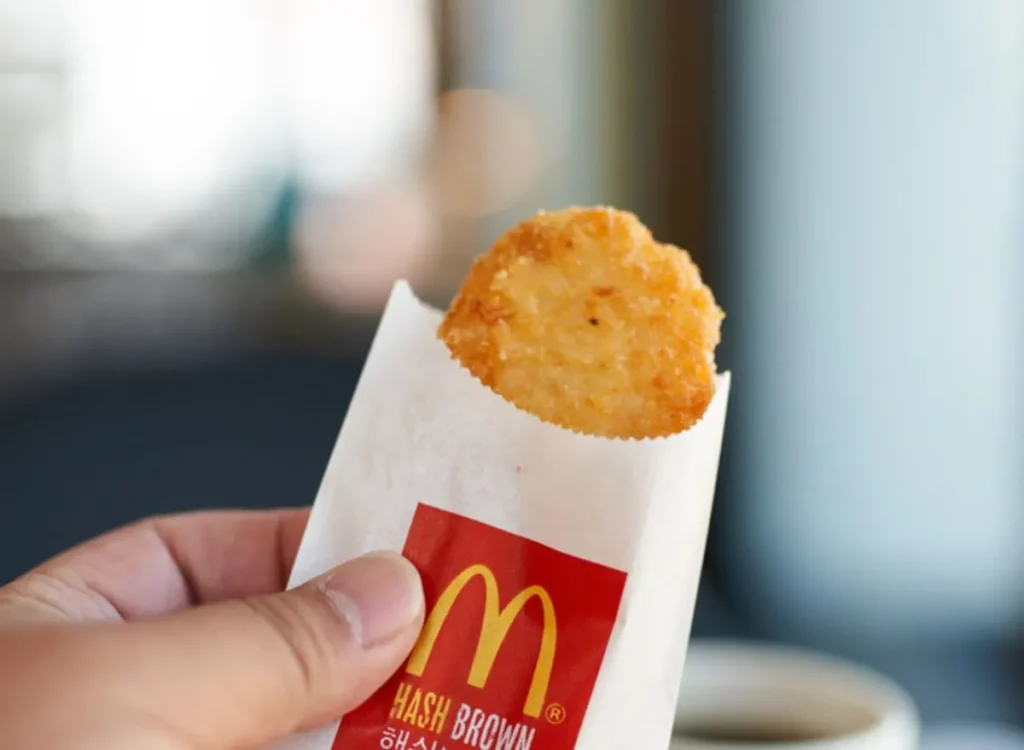Are you curious about the calories in McDonald’s hash browns? Look no further! In this blog post, we will not only reveal the calorie count of these delicious breakfast treats but also explore what makes McDonald’s hash browns so irresistibly tasty. We’ll also delve into McDonald’s commitment to food safety and allergen information, as well as considerations for those with special dietary needs. So, if you’re ready to satisfy your curiosity and make informed choices, let’s dive right in!
Beyond the Basics: The Secret Behind the Savory Taste of McDonald’s Hash Browns

McDonalds Hash Brown
McDonald’s hash browns have been a breakfast favorite for many, and the reasons are not far-fetched. The unique taste and texture that sets this fast-food delight apart is a result of carefully selected ingredients and a meticulously followed cooking process.
At first glance, the ingredients list may seem quite straightforward – potatoes, a mix of vegetable oils, and a variety of flavor enhancers. But there’s more to it than meets the eye. The potatoes used in McDonald’s hash browns are not just any regular potatoes. They are carefully chosen for their starch content and texture to ensure the perfect crispiness that we all crave.
The blend of vegetable oils, including canola oil, soybean oil, and hydrogenated soybean oil, plays a crucial role in achieving that golden-brown color and the crunch that makes every bite a delight. These oils are not only chosen for their high smoke points, making them ideal for frying, but also for their subtle flavors that enhance the overall taste of the hash browns.
But the real magic lies in the additional ingredients. The inclusion of corn flour, dehydrated potato, and dextrose adds an extra layer of complexity to the texture and flavor. Sodium acid pyrophosphate is used to maintain the color of the potatoes, ensuring they remain appetizing even after frying. The extractives of black pepper provide a hint of spiciness that balances the savory taste of the potatoes.
And then there’s the natural beef flavor, a unique blend that contains hydrolyzed wheat and hydrolyzed milk as starting ingredients. This is the secret ingredient that gives McDonald’s hash browns their distinctive taste, setting them apart from other fast-food hash browns.
However, while we revel in the delectable taste of these hash browns, it’s also essential to be mindful of the nutritional value they bring to our tables. This brings us to the question of how many calories are packed into these golden-brown delights, which we will explore in the next section.
Unraveling the Caloric Content of McDonald’s Hash Brown

McDonalds Hash Brown
When it comes to the caloric content of McDonald’s hash brown, it may surprise you. The delectable, golden-brown treat that you enjoy with your morning coffee or as a quick snack on the go is more calorific than you might imagine. While the exact number isn’t boldly advertised on the packaging or prominently displayed on in-restaurant menus, McDonald’s is committed to transparency and provides detailed nutritional information on their official website.
Check out: How Many Ounces are in a Large McDonald’s Cup? Unveiling the Thirst-Quenching Enigma
By referring to this online resource, you can discover that a single serving of McDonald’s hash brown harbors a significant number of calories. This caloric content is derived from the unique combination of ingredients that contribute to the hash brown’s distinctive taste and texture. The blend of vegetable oils, the carefully chosen potatoes, and the secret ingredient – a natural beef flavor blend, all contribute to the overall caloric value. If you like this topic read all about how many calories do McDonalds fries and chicken nuggets have.
It’s important to note that McDonald’s uses a rigorous scientific approach to determine the nutritional values of its dishes. The data is gathered from accredited laboratories, reliable published resources, and supplier-provided information, ensuring the accuracy of the nutritional facts. This method guarantees that the calorie count is based on standard product formulations and serving sizes, providing a consistent nutritional profile across all locations.
However, it’s worth mentioning that the caloric content of McDonald’s hash brown can slightly vary. Factors such as regional differences in ingredient sourcing, variations in serving sizes, preparation techniques, and product testing can result in minor discrepancies. Therefore, while the nutritional information provided is a useful guide, it should be seen as an estimate rather than an absolute value.
So, the next time you find yourself reaching for a McDonald’s hash brown, remember to consider its caloric content. While it’s perfectly fine to indulge in this crispy treat occasionally, moderation is key to maintaining a balanced diet.
McDonald’s Commitment to Food Safety and Allergen Awareness

McDonalds Hash Brown
McDonald’s, as a global leader in the fast-food industry, prides itself on its unwavering commitment to food safety, quality, and customer satisfaction. A significant part of this commitment is the careful consideration given to customers with food allergies or special dietary needs. Recognizing the importance of transparency in this matter, McDonald’s has taken proactive steps to ensure that customers can make informed decisions about their food choices.
McDonald’s official website provides a wealth of information about the ingredients used in their food. It specifically details the nine most common allergens, including milk, eggs, fish, shellfish, tree nuts, peanuts, wheat, soy, and sesame. This initiative allows customers to make knowledgeable choices about what they order, based on their individual dietary requirements and restrictions. Moreover, McDonald’s encourages its customers to consult with their healthcare providers if they have any doubts or concerns about their dietary needs. Find out when does McDonalds serve lunch and enjoy your favorite meal.
However, it’s crucial to understand that while McDonald’s strives to accommodate the needs of all its customers, the realities of kitchen operations can pose certain challenges. Shared cooking and preparation areas, as well as common utensils, can potentially lead to cross-contamination with allergens. Despite rigorous safety protocols and measures in place, the risk, albeit minimal, still exists.
Check out: How Much Does a 10-Piece McNugget at McDonald’s Cost? and How to Recreate McDonald’s Sweet Tea: Crafting the Perfect Blend at Home
This is not to deter individuals with severe food allergies from enjoying McDonald’s offerings. Rather, it is to ensure that they are fully aware of the potential risks and can make informed decisions. McDonald’s is dedicated to providing customers with safe, delicious, and high-quality food options. It is this commitment that has solidified McDonald’s position as a trusted and beloved fast-food chain worldwide.
As a consumer, it’s reassuring to know that a global brand like McDonald’s values its customers’ health and well-being. Their proactive approach towards allergen awareness and food safety is a testament to their dedication to serving quality food that everyone can enjoy.
Delving Deeper into Special Dietary Needs
Food choices are often influenced by personal, cultural, and health factors. McDonald’s recognizes this and has made a concerted effort to cater to the multifaceted dietary needs of its diverse clientele. While it’s true that McDonald’s does not officially certify or label any of their menu items as Halal, Kosher, vegetarian, vegan, or gluten-free, they have nonetheless expanded their menu over the years to include options that could fit within these dietary parameters.
For instance, their side salad could be a viable option for vegans and vegetarians, while their Apple Slices could be a suitable choice for those seeking gluten-free options. However, it’s important to note that these are not certified as such, and cross-contamination could occur. Therefore, individuals with severe dietary restrictions or allergies should exercise caution and consult with a healthcare professional before consuming these items.
McDonald’s commitment to transparency is evident in their provision of nutritional information, which is based on standard product formulations and serving sizes. However, it’s crucial for customers to understand that these values may fluctuate. Factors such as adjustments in serving sizes, variations in preparation techniques, differing sources of supply, and regional differences can all contribute to this variability. This is not unique to McDonald’s but is common across the fast-food industry.
Additionally, McDonald’s provides calorie information for fountain beverages on their website, which is based on standard fill levels plus ice. This is a valuable tool for those monitoring their caloric intake. However, the signage on beverage fountains in restaurants provides calorie information without ice, offering a more accurate representation for those who prefer their beverages sans ice.
In the fast-paced world of fast food, McDonald’s strives to meet the needs of all its customers, regardless of their dietary preferences or restrictions. While there are limitations to their offerings, their commitment to providing diverse and inclusive menu options is commendable.
Empowering Your Meal Choices
As we delve deeper into the world of McDonald’s hash browns, the information available about the ingredients and calorie content becomes a powerful tool in making informed decisions. The allure of the crispy, golden hash browns is undeniable, but understanding what goes into this delightful dish is equally important. It’s not just about indulging your taste buds, but also about nourishing your body in a way that aligns with your dietary needs and lifestyle choices.
McDonald’s commitment to food safety and transparency is commendable. They have made significant strides in catering to a wide array of dietary requirements, making it easier for customers to enjoy their meals without compromising their health or dietary restrictions. This dedication to food safety and inclusivity is evident in their diverse menu options, which aim to satisfy all palates while ensuring customer well-being.
Read more about: How Much Does a McDonald’s Ice Cream Cone Cost? Exploring Value, Flavors, and Freebies and Does McDonald’s Serve Delicious Hot Chocolate?
However, the ultimate control over what we consume lies in our hands. The knowledge we have about the ingredients and calorie content of McDonald’s hash browns empowers us to make choices that align with our personal preferences and dietary needs. Whether you’re a fitness enthusiast counting every calorie, a vegetarian exploring fast food options, or a food lover seeking to indulge in a guilty pleasure, the decision is yours to make.
Remember, indulgence and health aren’t mutually exclusive. With the right information and a balanced approach, you can enjoy the best of both worlds. So, the next time you’re at McDonald’s, let your newfound knowledge guide your choices. Enjoy your hash browns, knowing you’ve made an informed decision that caters to your unique dietary needs and preferences.
FAQ & Users Questions
1. How many calories are in McDonald’s hash browns?
The article does not mention the exact number of calories in McDonald’s hash browns.
2. What are the ingredients of McDonald’s hash browns?
The ingredients of McDonald’s hash browns include potatoes, vegetable oil (canola oil, soybean oil, hydrogenated soybean oil), salt, corn flour, dehydrated potato, dextrose, sodium acid pyrophosphate, and extractives of black pepper.
3. Does McDonald’s provide information about food allergies?
Yes, McDonald’s provides ingredient information for the nine most common allergens. However, it is important to note that there may be cross-contamination with allergens in the kitchen.
4. Where can I find the nutrition information for McDonald’s menu items?
You can find the nutrition information for McDonald’s menu items on their website. The information is based on standard product formulations and serving sizes.
5. Are McDonald’s menu items certified as Halal, Kosher, vegetarian, vegan, or gluten-free?
No, McDonald’s does not certify or claim any menu items as Halal, Kosher, vegetarian, vegan, or gluten-free.
